24th March 2001. A true story about the day the rebellion started. Part 3

While "civilised society" was growing a fluffy mustache and purchasing it's first motorbike, the people were all beginning to get very bored of all the random violence and endless family feuds.
Obviously this type of behaviour couldn't go on forever and at some point or another we all took a step up the evolutionary ladder and began codifying our common laws.
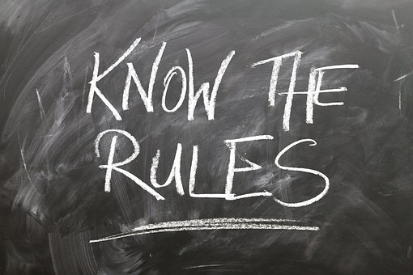
.jpg)
I am talking of a time long before the year of Magna Carta and Article61, when religious confusion was rife, written law did not yet exist and the Kings of Great Britain seemed to be from all over the UK...
The first Kings of England
The laws of Ethelberht
source
1 [Theft of] God's property and the Church's shall be compensated twelve fold; a bishop's property eleven fold; a priest's property nine fold;a deacon's property six fold; a clerk's property three fold. Breach of the peace shall be compensated doubly when it affects a church or a meeting place.
2 If the king calls his lieges to him, and anyone molests them there, he shall pay double compensation, and 50 shillings to the king.
3 If the king is feasting at anyone's house, and any sort of offence is committed there, twofold compensation shall be paid.
4 If a freeman robs the king, he shall pay back a nine fold' amount.
5 If one man slays another on the king's premises, he shall pay' 50 shillings compensation^.
6 If a man slays a free man, he shall pay 50 shillings to the king for infraction of his seiguorial rights'.
7 If [he] slays a smith in the king's service, or a messenger' belonging to the king, he shall pay an ordinary wergeld^
8 The king's mundbyrde shall be 50 shillings.
9 If a freeman robs a freeman, he shall pay a three fold compensation, and the king shall take the fine, or' all [the man's]
goods.
10 If a man lies with a maiden belonging to the king, he shall pay 50 shillings' compensation.
(There are around 70 different laws in this document)
King Ine of Wessex.
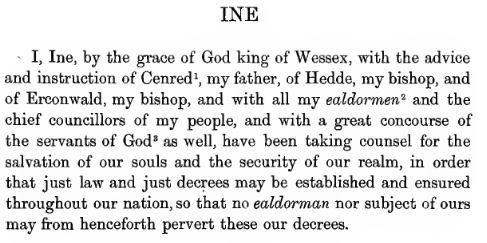
source- Early kings of England
Ine's Laws are 76 in total and according to Bede, Ine reigned from 688 to 725.
King Ethelbert and King Ine, were rulers in a time when there was more than one king. The British empire had yet to be formed and England was made up of many different communities, each having its own leader. Because of this, laws that were made by different kings were "the laws of the land". Many of these laws were quite similar to one another and many of them concentrated on protecting the King and his property.
This is a very primitive way of codifying law and we must give a little lenience to its egotistical mannerisms. With great power comes great responsibility, but that doesn't mean we got it right straight away. These early kings were pioneers in law-making and their decision to create a binding set of laws, in order to keep the peace, was more than groundbreaking.
All of the Kings and Queens below have been entrusted with the authority of the people and given what is commonly known as "Royal prerogative"
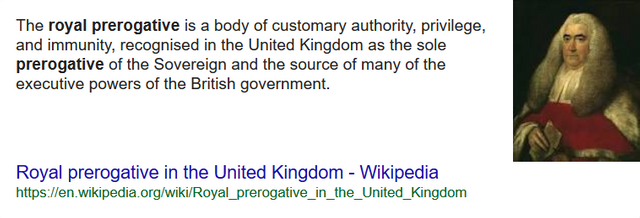
source
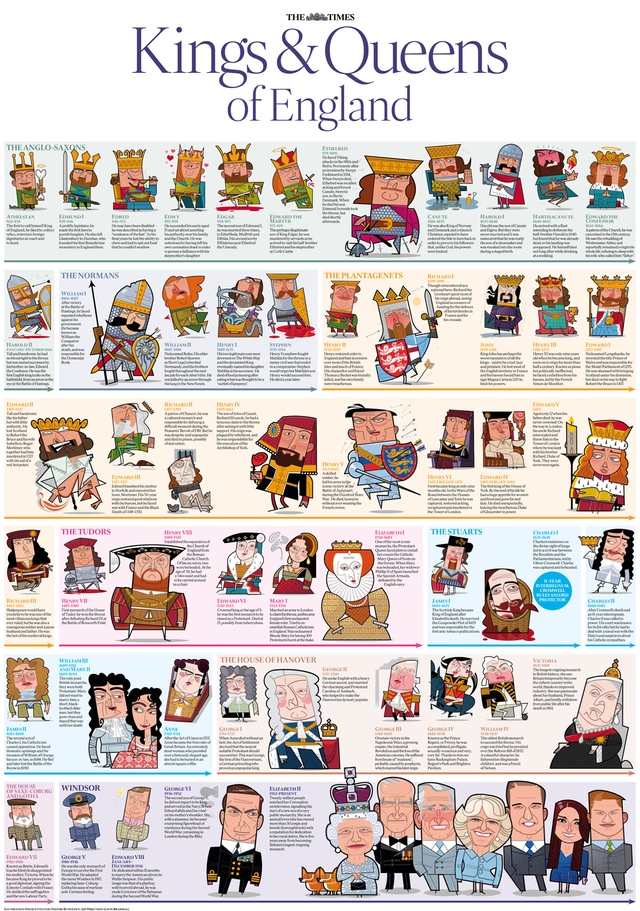
source
KING ALFRED THE GREAT
.png)
source
Soon after king Ine & Ethelberth had met their makers, it was the turn of a new King to take the throne and he would be ruling in a fashion that was unprecedented in the UK.
All hail England's first true king.
When King Alfred the great came to the throne, in 871AD, he did so with the blessing of all the counties of England. Now I am not going to be fooled into thinking this was one big national hug-a-thon and that King Alfred was loved by all. That would indeed be a foolish act and I won't have you falling for it either.
These were still medieval times and society was just beginning to come to terms with its responsibility to others, both presently and for those who came after...(Laws set in perpetuity, you might say...)
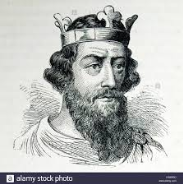.png)
KING ALFRED 'THE GREAT' AND HIS DECLARATION FOR A NEW ERA OF LAW
Now I, King Alfred, have collected these laws, and have given orders for copies to be made of many of those which our predecessors observed and which I myself approved of. But many of those I did not approve of I have annulled, by the advice of my councillors, while [in other cases] I have ordered changes to be introduced'. For I have not dared to presume to set down in writing many of my own, for I cannot tell what [innovations of mine] will meet with the approval
of our successors. But those which were the most just of the laws I found — whether they dated from the time of Ine my kinsman, or of Offa^, king of the Mercians, or of ..Ethelberht, who was the first [king] to be baptised in England — these I have collected while rejecting the others. I, then, Alfred, King of the West Saxons, have shewn these to all my councillors, and they have declared that it met with the approval of all, that they should be observed.
pic source script source
Alfred recognised that he had centralised the leadership of the UK, by becoming the first to rule alone, and this meant he would be bringing many different "laws of the land", from many previous kings, together inside a single set of COMMON LAWS...

From Alfred "the Great" to "Evil" King John.
If we look at what has happened to society, since the first Welsh and English law makers appeared, you will notice that tyranny pulls us closer to the finish line and then 'the people', on the other end of the rope, mount a comeback. Sometimes this reaction can be stronger than others and both sides have come close to being beaten, for good.
In the seventeenth century, 400 years after Magna Carta was created, the UK went through one of the greatest revolutions in its history and the title it was given reflects just how important it was.
THE GREAT ENLIGHTENING
As you can see, it was Magna Carta 1215 that was referred to, by Sir Edward Coke(pronounced Cook) and it was the 61st article of 'The great charter' that had to be invoked to bring about this Lawful rebellion.
'The people' had indeed enlightened themselves and this was to the fact that over the last 400 years, laws had been usurped by the lobbying of corrupted officials and once again tyrants had gained positions at the top. The laws that their ancestors had agreed upon in 1215 and the standards set by Alfred the Great, in 871, had been forsaken in the name of empire building and elitism.
It was the early-industrial age and ambitious men were jostling to secure their families future at the cost of others.
But let's not get ahead of ourselves.
To understand why March 24th, 2001, was such an important date, we have to understand what happened around the time 'The Great Charter' was sealed into perpetuity.
King John is seen here signing Magna Carta, while looking somewhat persecuted and vulnerable. Hmmm, I think it's time to set a few things straight around here...
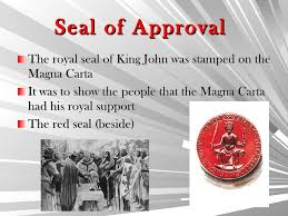.png)
pic source

Evil King John
There is very good reason why King John was given this extra title before his name and the story of what happened in the weeks after Magna Carta was sealed, gives a great example of why he deserved such a name.
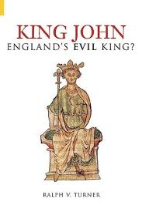.png)
Point is, the bloke gave one of the worst examples of leadership, on par with Emperor "crazy-pants" Caligula and he demonstrated this on his visit to Nottingham Castle, soon after he was given the Ultimatum to agree to
'The Great Charter of 1215'.
King John was not a happy bunny and after he had left Runnymede, on the 15th of June, 1215, he fled to Nottingham Castle.
King John was pissed off and needed to quench a vengeful thirst. Due to agreeing to uphold the Laws of Magna Carta, King John still claimed all his privileges and one of those, or should I say 28 of those, where the children of a Welsh dignitaries who had joined the rebellion leading up to Runnymede.
In 1212 King John held some 28 sons of Welsh noble families hostage in the castle. The boys, some as young as 12, lived at the castle for some time, and were allowed free rein within the walls. Then one day, the precise date is unknown, King John ordered all the hostages executed. A chronicler states that the boys pitiful cries rang around the castle as one after the other they were taken up on the ramparts and hanged in a row. Their ghostly pleas for mercy are still said to be heard within the castle precincts.
source- BBC "date is unknown"...
King john managed to scare the Barons enough for them to give up on Magna Carta too!
(Don't worry. Set in perpetuity, remember).
Only trouble was, the barons weren't the only folk who had agreed to the charter and I think this is where the barons give Magna Carta a bad name.
OK, the Barons may have dropped the charter as soon as they realised they weren't going to get their castles back, but they really didn't realise what they had set into motion and why they were given such support in the first place. Oh and just to finish the story of King John, he fled to Newark Castle not long after he had murdered 4 children and that is where his health failed him completely.
source- Rebel dan
source- Rebel dan
Where the laws of Alfred had began to show cracks and allow tyrants like King John, back on the throne, Magna Carta seemed to be the answer. In just the same vain as King Alfred had done himself, Magna Carta was to be fair to all, it was to be simple to understand and available to all. No law was to be hidden and therefore all laws were considered to be common knowledge.
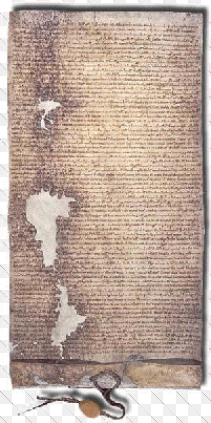
pic source
One of the more obvious clauses of Magna Carta was mentioned in Sir Edward Coke's petition to King Charles, just before his royal head was chopped off... Put simply, the Law now stated that everyone was to be accountable for the crimes they committed and this certainly included the King
(or Queen as this document was....Yes you guessed it, SET IN PERPETUITY).

IMPORTANT CLAUSES OF MAGNA CARTA 1215
Magna Carta as agreed at Runnymede in 1215 includes provisions that are still fundamental to English law. Clauses 39 and 40, for example, forbid the sale of justice and insist upon due legal process.
Translation into modern day terms
You can not bribe any part of the legal system and you mustn't attempt to alter the Law, without it being done under the strictest of terms set out in the constitution.
(Something that Ted Heath forgot, when he signed the UK into the EEC).
From this sprang not only the principle of habeas corpus.
Translation
Habeas corpus - The accused should not be held indefinitely and instead should be given a trial by jury, which must be made up of the accused peers.
Even the presumption of innocence pending conviction can be traced back to the provisions of Magna Carta clause 40.
Translation -
If you have a knife in your kitchen, it doesn't give someone the right to accuse you of 'conspiracy to murder'.
As it says on the tin Innocent until proven guilty.
From clause 14 of the 1215 Magna Carta springs the idea of no taxation without representation, and with it the establishment of a common council, duly embodied in Parliament, as a means of obtaining popular consent.
Translation
THE EXPENSES SCANDAL!!! £10,000 for clearing a moat... Does that ring any bells?! Well, just in-case things are still unclear...
You cannot tax the public, without giving full disclosure of where that money goes - At present, our tax money is invested into triple 'A' rated stocks, such as military weapons, oil and Fracking companies. Basically the worst of the worst.
Besides such general principles, however, Magna Carta also articulates a number of points that to a modern audience might appear inconsequential or simply bizarre.
Question... Would you consider it "bizarre", to put a clause into a contract, that states that if the other party defaults, you can then declare a vote of no confidence and defer authority to a temporary power, until order has been resumed?
passages source from the British Library

Now I do hope your answer to that was a big fat no? As this is the only reason why any sane human being would have agree to such a binding treaty, in the days of Evil King John. As I have already explained, John was a bit of a git and as the people of the UK had nobody else who was fit to run the country in John's place, we just had to think outside the box and evolve King Alfred's "greatness" even further.
The people who lived in the time of Magna Carta and King John, lived simple lives compared to ours, but that doesn't mean they were simple-minded at all. They all had grandparent who told stories of Kings breaking their word and changing Laws as they pleased. It was time for all that to stop and the 61st clause of Magna Carta 1215 was all it would take to accomplish this.
The simplest route.
Just think about it for a second... The government becomes corrupted and enough people raise the alarm, then certain lawful protocols are set into place. Concerns are then taken further and raised between the 2 councils. If agreement is not reached by the people and their oppressors/representatives, then the people have the option of continuing to be ruled by force or transfer their allegiance, temporarily, to the Barons committee and revoke the powers of the crown, under terms agreed in Article 61 of Magna Carta 1215.
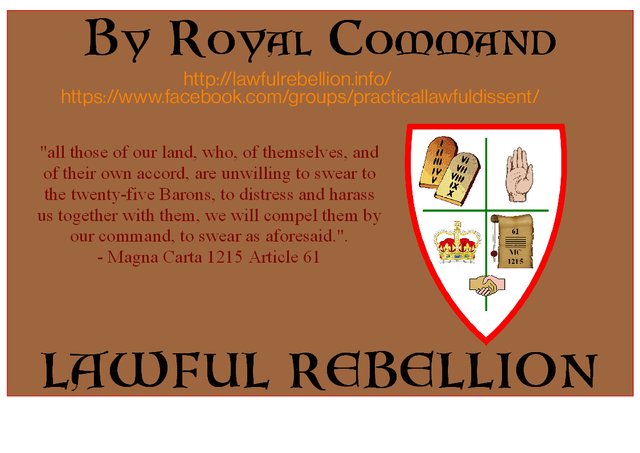
source
Now does that sound too far fetched? And more to the point, does that sound like it has anyone else in mind, other than creating a piece of law that will protect "the people" until the day comes when someone decides to remove it from the constitution.
But who and why would anyone want to do a thing like that....?
Not just Article 61, but Many of these laws were drawn upon in the lead up to the British Civil war of 1648.
The crown and his agent had again grown greedy and pulled us all too close to the edge. Our reaction was honourable for the most part and it is no coincidence that we are, pretty much, 400 years down the line and it all seems to be going a bit "King John" again...
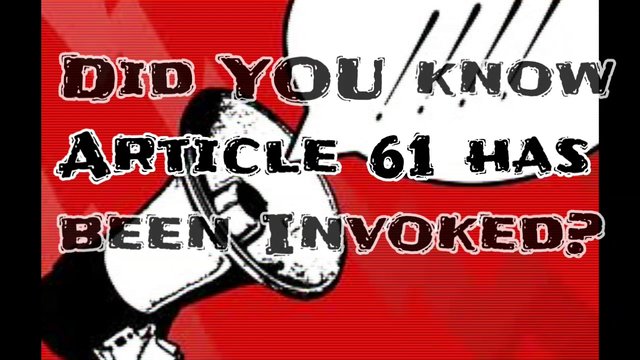
source
Join me in the final part 4 of this series and find out exactly why, in 2001, Article 61 was invoked and then find out just what that means to you, me and all the other sovereign people of the commonwealth....
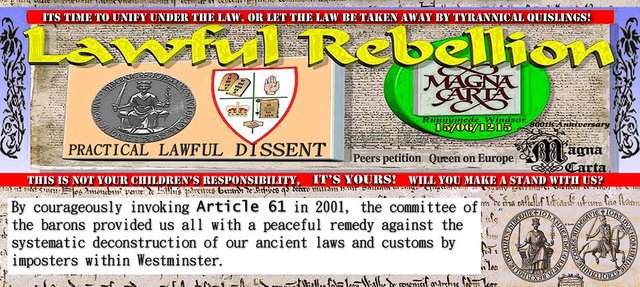

PTYAY
Written by Rebel-Dan.
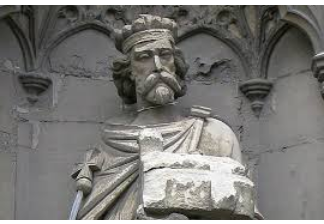
.png)
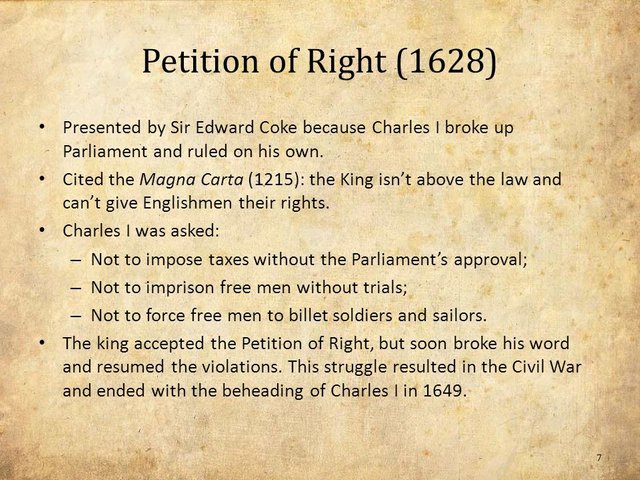
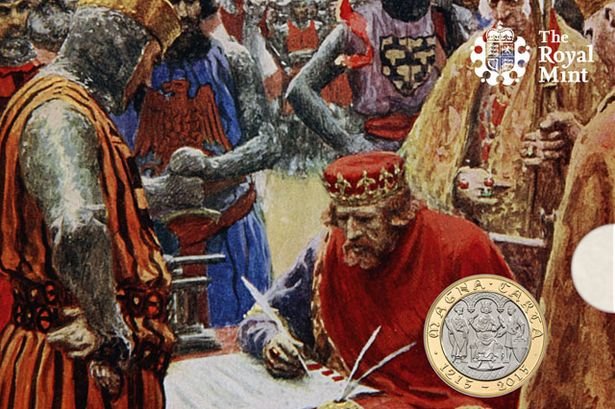

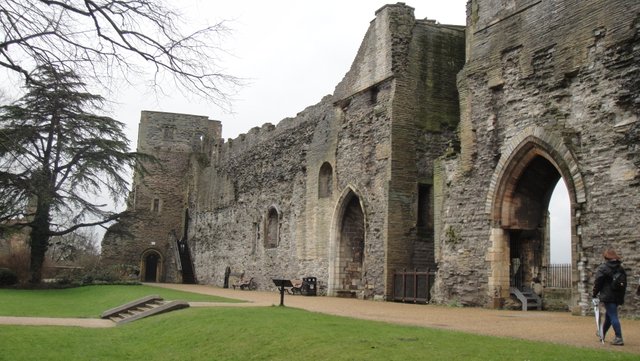
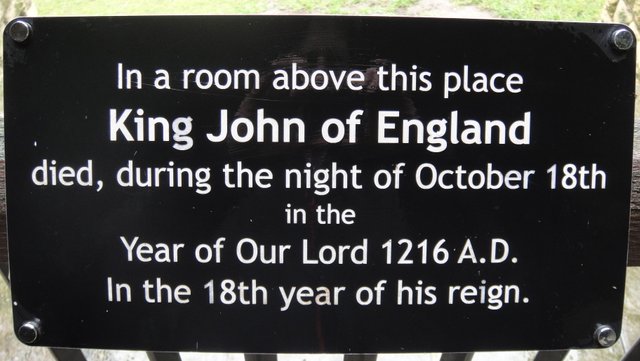

Curated for #informationwar (by @truthforce)
Congratulations! This post has been upvoted from the communal account, @minnowsupport, by Article61 - Rebel-Dan from the Minnow Support Project. It's a witness project run by aggroed, ausbitbank, teamsteem, theprophet0, someguy123, neoxian, followbtcnews, and netuoso. The goal is to help Steemit grow by supporting Minnows. Please find us at the Peace, Abundance, and Liberty Network (PALnet) Discord Channel. It's a completely public and open space to all members of the Steemit community who voluntarily choose to be there.
If you would like to delegate to the Minnow Support Project you can do so by clicking on the following links: 50SP, 100SP, 250SP, 500SP, 1000SP, 5000SP.
Be sure to leave at least 50SP undelegated on your account.